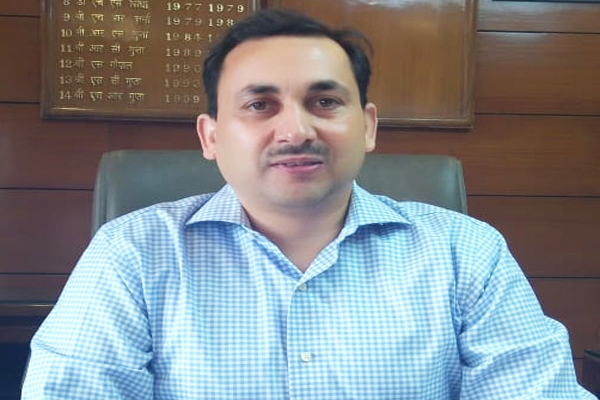
In the last few years, CBSE has undertaken various efforts to shift the education paradigm from rote learning to experiential learning. “Experiential learning means – learning by doing – a system where students undertake projects, activities, go to field, develop sensitivity and learn to face challenges”, says Anurag Tripathi, Secretary, CBSE, in conversation with Chandan Anand of Elets News Network (ENN).
What has been your topmost priority ever since you took over the charge as CBSE Secretary?
As CBSE secretary and as board representative, the topmost priority of the organisation is to conduct Class 10th and 12th board examination. To adopt worldwide practices and ensure skill and value based education is imparted to the students in schools.
We have made the last CBSE Board examination error-free and leak-proof. Besides, digital innovations were followed in the process of conducting examinations. We have changed the assessment process internally. Further, we have focused on capacity building of teachers to reduce the problems faced by students during re-evaluation. More than 2,00,000 teacher evaluators have been given training. These efforts have lead to smooth conduct of Class 10th and Class 12th board examinations.
To enhance the learning outcome and academic quality, we have undertaken various innovative measures that can augment teaching-learning process, improve experiential learning, boost skill development in students and make them innovative & creative thinkers. We want to ensure that 2 Crore children studying in our schools not just rely on rote learning but must possess necessary skills and can serve as value based citizens of the country.
What initiatives CBSE has been undertaking to make sure that schools shift from rote learning to experiential learning smoothly?
In last 50 years, there has been an enormous shift in the way education is imparted (studying under tree to smart classrooms) but the practice of rote learning is still existent. This system of one way education doesn’t provide for the way to check the learning outcome of the students – whether their learning has improved and ethics & values are being adopted or not.
In the last few years, CBSE has undertaken various efforts to shift the education paradigm from rote learning to experiential learning. Experiential learning means – learning by doing – a system where students undertake projects, activities, go to field, develop sensitivity and learn to face challenges. Parents and teachers have a big role to play in creating an experiential learning environment for students.
We have started capacity building of teachers and principals in the entire country. Last year, 2, 00,000 teachers were trained. This year, more than 1, 00,000 teachers have been trained till now and I am hopeful by the end of this financial year, the figure will cross 3, 00,000. Secondly, we are focusing on Parents Orientation to ensure grooming & skilling of students and building right attitude & behavior at home, where they spend maximum time.
Thirdly, we are focusing on infrastructural changes to boost digital education. Fourthly, we have tried to change the module of the board examination question paper –integrating some creative & innovative questions that cannot be answered by memorizing but need thought process, research and understanding to answer. Fifthly, we have changed the assessment system by including objective type questions, one word Q/A, True/False, Short Q/A etc.
Also Read: CBSE to release board exam date sheet in December
What is your take on Draft New Education Policy? How it is going to transform the face of education in India?
The most important aspect of Draft New Education Policy is that now ‘education’ has come in the priority list of the government. The education budget will definitely increase which will lead to development of better human resource.
Secondly, this education policy is seriously focusing on capacity building of teachers and principals – who are the ultimate source of imparting knowledge to students. Further, it lays a great emphasis on Skill & Vocational training of students to ensure they have the necessary expertise to earn their livelihood in the future.
The policy also stresses a lot on Early Childhood Education on how to ensure natural development of children from the tender age. There is also due emphasis on assessment, board examination and internal assessment.
I am hopeful that the new education policy is going to bring a huge transformation in the education system of India, in the years to come.
Did the practice of preponing Board exams by 15 days this year, reap the desired benefits? Will the next year’s examination time table be same as this year’s?
Like this year, the board examination 2020 will also commence 15 days earlier. This pre-poning process has been done for vocational & skill subjects and minor subjects in which only a few number of students appear.
Earlier, exam time-table used to be two-months long but now we have squeezed it to one month. Further, this year we have completed the assessment/evaluation process in one month instead of two, thanks to technological innovations and efforts undertaken by the department.
The core purpose of compressing the examination process is to release results on time thereby allowing ample time to students to apply for admissions in various Indian and International Colleges/ Universities.
Tell us about the new reforms taken by CBSE with regards to its affiliation policy?
At present, CBSE heads over 22,000 schools and every year we receive more than 10,000 applications related to affiliation, extension, up-gradation and subject change. Two years ago, we shifted the affiliation process from offline to online mode. From submitting application to uploading of documents to providing the affiliation, every step is done online. By adopting the latest technology, the process of affiliation has become quite smooth and we have cleared the pending cases of last 6 to 8 years. The introduction of new and innovative technology has made the process simple for us as well as the schools.






















